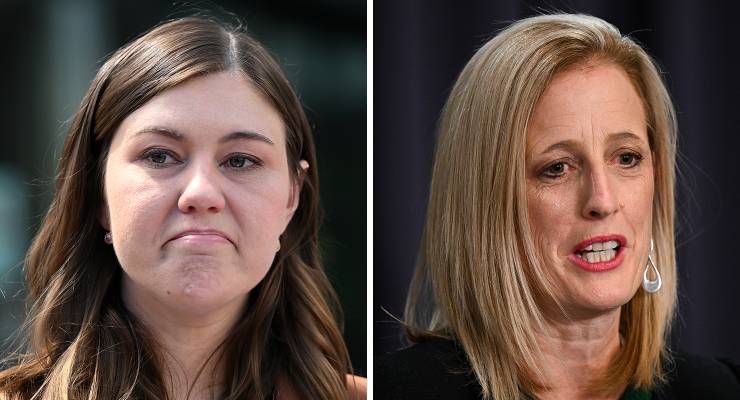
Even by the standards of Coalition-News Corp campaigns against Labor, the conspiracy theory about Brittany Higgins and her partner David Sharaz working with Labor to “weaponise” Higgins’ allegations of sexual assault in the office of then-defence minister Linda Reynolds in 2021 is particularly thin, and particularly hypocritical.
The claim that then-opposition Senator Katy Gallagher misled Parliament turns out, on closer inspection, to have been a heated argument in Senate estimates after Reynolds effectively accused Labor of initiating Higgins’ allegations (“I know where this started”), prompting a furious reaction from Labor’s then-foreign affairs spokeswoman Senator Penny Wong and Gallagher. As opposed to, say, a prime minister standing up in question time with a prepared answer that was a blatant lie about the status of the “Gaetjens review” of how many people in the prime minister’s office knew of the allegations.
Scott Morrison’s office also sought to background journalists against Sharaz in an effort to portray Higgins’ allegations as politically motivated. The “weaponise” conspiracy theory has been peddled from day one, and it’s been false since day one.
Many in the media, it seems, still can’t understand the deep anger that Higgins’ allegations (denied by her alleged assailant), historic allegations about Christian Porter (again, denied by Porter), other revelations about how toxic Parliament House was for women, and the Morrison government’s comprehensive failure to address them, elicited among so many people. The tens of thousands of women who attended March 4 Justice rallies not just in Canberra but in other cities could not have been an authentic reaction to a government profoundly out of touch with, if not actively hostile to, the idea of safer workplaces and better protections against sexual assault, bullying and harassment. Instead, it must have been the result of a left-wing conspiracy.
And all along, the desire to destroy Higgins, to publicly punish her as an example of what happens to those who threaten people in power, has driven a sordid media campaign fuelled by leaks. Last year I explored how the campaign against Higgins — the smears, the interference in the trial of the man she accuses of raping her, the extensive leaking of information by the Australian Federal Police — reflected a systemic response to the threat that she posed to those in power.
Since then, particularly with the leaking of her private communications, the campaign to destroy her has only escalated, and its perpetrators — an aggrieved political party and its apparatchiks, its media supporters, a deeply compromised and politicised federal police — have been joined by other media companies (coincidentally, in Seven and the Daily Mail, both owned by right-wing billionaires).
Buried within the most recent attacks, based on the leaking of texts to politicians and staff, is the insistence that there was something fundamentally illegitimate about Higgins and Sharaz attempting to generate political interest in her efforts to obtain justice and expose the toxic culture of Parliament House. Real rape victims, the suggestion appears to be, simply let the criminal justice system do its job, rather than trying to engage politicians, especially opposition politicians.
As every woman in Australia knows, just letting the criminal justice system do its job with alleged rapists virtually guarantees the rapist will walk free. Even with a greater willingness of women to report sexual assault, and a greater willingness of police forces and prosecutors to take the crime seriously, the conviction rate remains a source of national shame, with estimates varying between 3% and 12% of cases. It seems the last place that sexual assault victims will get justice from is the justice system.
If Higgins and Sharaz are guilty of anything, it’s only what there’s an entire industry devoted to in Canberra: seeking to influence politicians to achieve an outcome. In their case, it’s an outcome they should be proud of — the Commonwealth Parliament finally took steps to curb the toxic nature of employment of political staffers and provide more avenues of redress for those who are victims of assault, harassment and bullying.
It’s OK for large corporations, media companies and the super-rich to influence politicians, it seems, but a woman alleging sexual assault? An outrage. Higgins, it’s implied, deserves to have her texts leaked, for engaging in such an activity.
She was, in other words, asking for it.
And no one is demanding that we see the texts exchanged between lobbyists, corporate executives, tycoons and politicians and journalists — something that would be far more revelatory of how power really works in Australia than the leaking of Higgins’ texts.
As many have noted, the signal that the latest attacks on Higgins sends to all women is to discourage them from reporting sexual assault at all, in fear of the colossal invasion of privacy that will be the result. That is one of the goals, not merely collateral damage.
Higgins’ ordeal is exemplary punishment by a system of power, intended to convey to all women that accusing a man of sexual assault will expose them to painful consequences, and not just confined to watching him walk away free. And for women who dare to do so when it embarrasses those in power, the pain will be profound indeed.








Crikey encourages robust conversations on our website. However, we’re a small team, so sometimes we have to reluctantly turn comments off due to legal risk. Thanks for your understanding and in the meantime, have a read of our moderation guidelines.